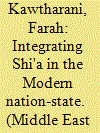| Srl | Item |
| 1 |
ID:
147297


|
|
|
|
|
| Summary/Abstract |
This article addresses one aspect of the political thought of Shaykh Muhammad Mahdi Shams al-Din, head of the Islamic Shi'i Supreme Council in Lebanon between 1978 and 2001. It examines his call for Shi'a to politically integrate into their respective nation-states. This was a political position Shams al-Din contextualized in his examination of Shi'i doctrine's historical approach to unjust rulers, which led him to infer the permissibility of cooperation with modern governments. Shams al-Din's conviction of the necessity of national integration stemmed from his concern about the development of sectarian militancy among Lebanese Shi'a, especially his perception of Hizbullah's pursuit of an independent political agenda. In his opinion, Hizbullah's approach alienated Arab Shi'a from their societies and posited a threat to their ability to live in multiconfessional or Sunni-dominated societies.
|
|
|
|
|
|
|
|
|
|
|
|
|
|
|
|
| 2 |
ID:
147294


|
|
|
|
|
| Summary/Abstract |
In postrevolutionary Tunisia, local politics have played an important role in the reconstruction of political authority in the wake of regime change. Continuities of governance between the old and new regimes, the local emergence of new social and political actors, and the competition between new and old local actors, as well as between them and the central state, have challenged the authority of national institutions and elected officials. As national actors attempted to rein in local experiments with "direct democracy," local politics generated resistance toward the Islamist-led Ennahda coalition.
|
|
|
|
|
|
|
|
|
|
|
|
|
|
|
|
| 3 |
ID:
147296


|
|
|
|
|
| Summary/Abstract |
This article looks at Hizbullah's politico-economic and socioeconomic policies in Lebanon. It first analyzes Hizbullah's economic thought and its origins. It then studies the party's policies in the various governments in which it has participated and how they have responded to changes in its social base as the Islamic movement has grown among larger sections of the Shi'i middle class and bourgeoisie. Analyzing Hizbullah's positions and policies helps us understand its evolution and integration within the Lebanese political system.
|
|
|
|
|
|
|
|
|
|
|
|
|
|
|
|
| 4 |
ID:
147295


|
|
|
|
|
| Summary/Abstract |
The Tunisian General Labor Union (UGTT) played a major role in the 2010/11 Tunisian revolution and in the subsequent democratization process. This article seeks to explain why the union was capable of taking on this role in light of the fact that, before the revolution, it cooperated with and was heavily infiltrated by the regime of President Zine El-'Abidine Ben 'Ali. By describing the UGTT's internal struggles during the dictatorship, the article claims that the UGTT demonstrated elements of both resistance and compliance. This duality made it possible for the organization to survive authoritarianism and also be a credible player in the transition to democracy. The article shows, in contrast to the dominant theories within democratization studies, that a regime-affiliated civil society organization can play an important role in the democratization process.
|
|
|
|
|
|
|
|
|
|
|
|
|
|
|
|